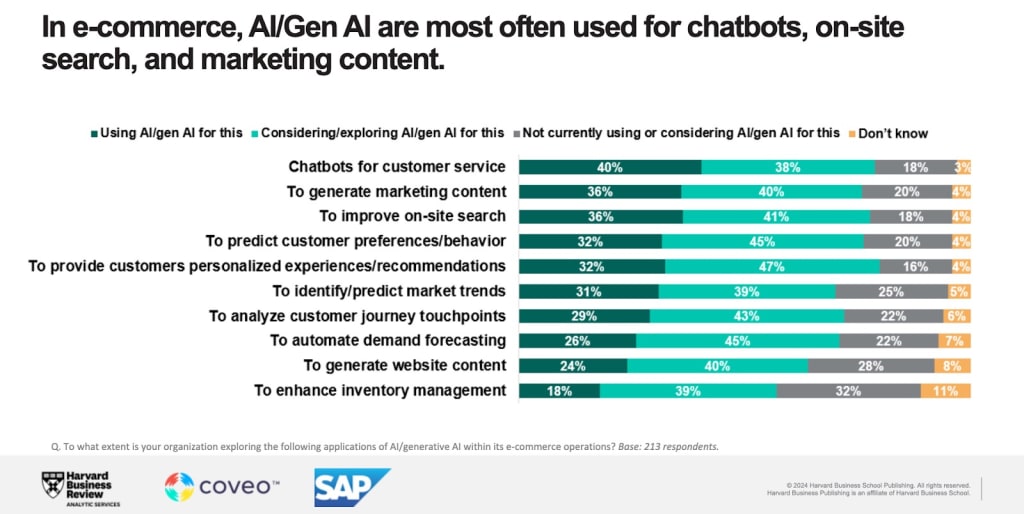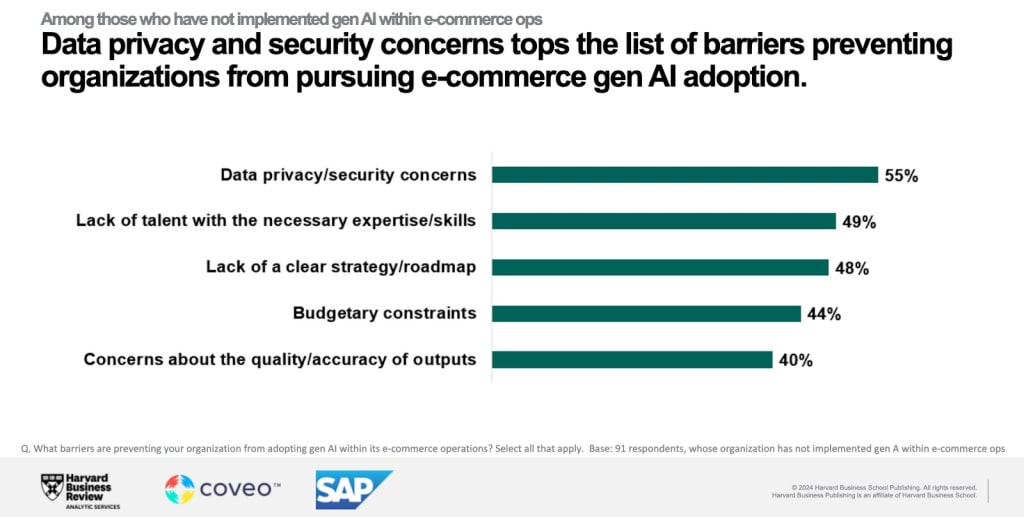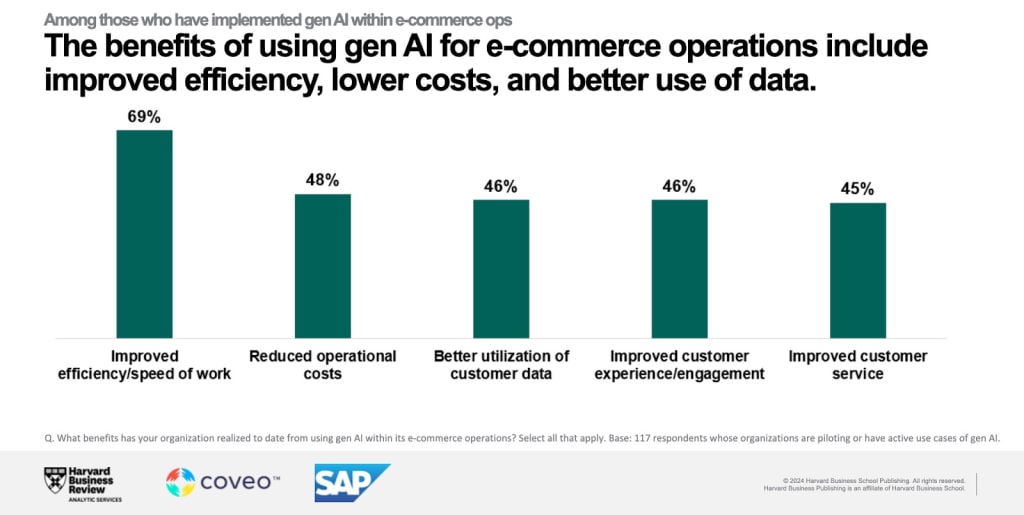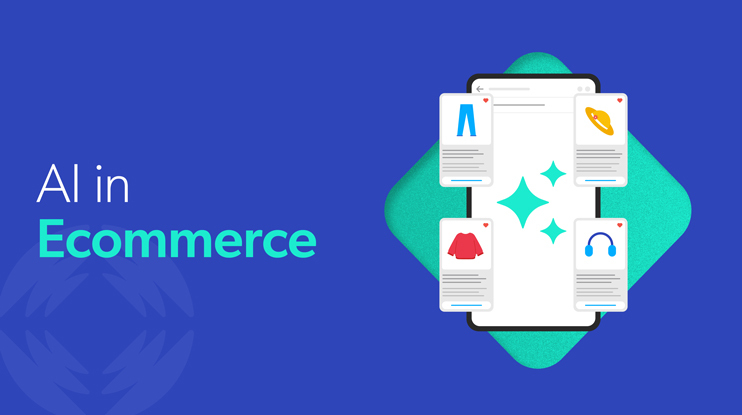The AI revolution has sparked waves of innovation, excitement, and disruption for many businesses, but as we transition out of the initial AI hype cycle, what are the practical realities of AI in ecommerce?
A recent Harvard Business Review Analytic Services Report, AI: The Secret to a Thriving Ecommerce Business, cosponsored by SAP and Coveo, highlights a pivotal shift in the AI landscape by 2025, demanding not just innovation, but demonstrable value. Based on a survey of over 200 respondents, the report offers valuable insights into AI adoption, challenges, and strategies to help businesses drive measurable impact and refine their approach to AI in ecommerce.
In this post, we share key findings from the report and what they mean for ecommerce businesses.
Drawing on insights from an expert-led webinar featuring HBR, Coveo and SAP, we’ll break down where organizations are in their attitudes towards AI and GenAI in ecommerce, the extent to which they are being deployed, and the challenges businesses face in adoption.
Why AI Matters for Ecommerce Today
Before jumping into the research findings, let’s take a step back to understand why AI is so critical for ecommerce today. The simple truth? Customer expectations are evolving at lightning speed.
Today’s shoppers don’t differentiate between online and offline experiences. They demand a seamless journey across every channel. Whether they’re browsing on mobile, engaging on social media, shopping online, or walking into a store, customers expect consistency and connection.
Customers now also expect technology to feel as intuitive and responsive as interacting with a human. Whether it’s a website, app, or virtual assistant, they assume it will seamlessly handle their needs and provide helpful solutions.
This is where AI becomes a game-changer, empowering brands to anticipate customer needs, personalize interactions, and create cohesive experiences across touchpoints. It’s not just about meeting immediate expectations, rather building long-term loyalty and maximizing customer lifetime value.
When brands deliver these integrated, personalized experiences, they forge deeper customer relationships that drive profitability and sustainable growth.
Key Takeaways from the HBR Report
1. AI and GenAI Are Table Stakes for Ecommerce Success
The survey highlights the increasing importance of AI and GenAI in ecommerce:
- 70% of respondents say AI is critical to their success.
- 65% emphasize GenAI’s role in shaping the future of the industry.
- 90% cite personalized customer experiences as essential for growth.
These findings make one thing clear: businesses that fail to leverage AI risk falling behind. Personalization is no longer optional; it’s an expectation, and AI is the key to delivering it at scale.
Interestingly, when it comes to advocating for AI and GenAI within organizations, 45% of respondents pointed to business departments as the strongest supporters, while IT and tech teams accounted for 38%. This division signals a broader organizational trend: AI is no longer confined to the realm of technical innovation but is now recognized as a strategic driver of business growth.
“AI and GenAI are viewed as fundamental to success. And although embedding AI in ecommerce is easier said than done, the research shows us that business departments clearly see its value.”
Alex Clemente, Managing Director, HBR Analytic Services
These findings reveal two important insights for businesses to consider as they navigate AI adoption:
AI is a Strategic Imperative: The widespread recognition of AI and GenAI as essential tools signals a tipping point for the industry. Companies that lag behind in leveraging these technologies risk falling short of customer expectations for personalization and operational excellence. The overwhelming focus on personalized experiences highlights a pressing need for businesses to integrate AI-driven insights into every touchpoint of the customer journey.
Collaboration is Key: As AI moves from the backend to the forefront of customer experience, collaboration between business and IT teams becomes critical, requiring significant cultural and operational shifts. Business teams see AI as a means to achieve tangible outcomes such as increased customer engagement, enhanced product discovery, and improved sales performance. Meanwhile, IT teams remain critical for ensuring the scalability, security, and integration of AI solutions. This dual ownership means that businesses must foster stronger collaboration between these groups to align technical capabilities with strategic objectives.
2. 40% of Businesses Are Actively Using AI in Ecommerce
The report shows that 40% of businesses are actively using AI in ecommerce, with 31% leveraging GenAI for content creation, including marketing emails and product documentation.
Top applications include:
- Chatbots for customer service
- Personalized recommendations
- Predictive analytics for customer behavior
- Optimizing ecommerce site search
These use cases highlight how businesses are using AI to streamline operations and drive efficiencies, particularly in content creation, where human oversight ensures accuracy and relevance while mitigating perceived risks.

The findings illustrate AI’s growing role in transforming ecommerce operations. Popular use cases like chatbots and personalized recommendations show how businesses are focusing on improving efficiency and customer experience. While chatbots are often an entry point into GenA and are used for handling routine customer inquiries, the future of AI in customer service lies in deeper integration. By embedding GenAI into the broader ecommerce ecosystem, businesses can elevate customer interactions from basic responses to seamless, conversational experiences.
“GenAI can go beyond handling simple queries to deliver advanced case deflection and product education, for example. By leveraging rich product knowledge bases, it provides answers in a way that feels natural and intuitive, reducing the need for human intervention and significantly enhancing customer satisfaction.”
Simon Langevin, VP of Product, Coveo
As businesses continue to explore AI and GenAI, the challenge will be balancing automation with human oversight to maintain trust and accuracy. Companies that focus on scalable, customer-centric applications will position themselves as ecommerce leaders.
3. Data Privacy and Security Remain Top Concerns

The report highlights data privacy and security as the leading obstacles to AI adoption in ecommerce, with 55% of companies citing these issues as their top concern. Notably, even businesses already using AI face similar challenges, compounded by technical integration hurdles and the difficulty of demonstrating clear economic benefits. These concerns underscore the complexity of implementing AI technologies in a way that protects sensitive information while delivering tangible value.
Regulatory frameworks such as GDPR and CCPA further elevate the stakes, emphasizing the importance of AI solutions that prioritize customer trust and comply with stringent data protection standards. Properly implemented, AI can align with these regulations, enhancing both operational efficiency and customer confidence.
These findings uncover the dual challenge businesses face: meeting rigorous data privacy requirements while navigating the complexities of AI implementation. For companies hesitant to adopt AI, fears of data breaches and non-compliance dominate the conversation. Meanwhile, businesses already leveraging AI must address not only these issues but also the technical skills gap and integration challenges that can hinder success.
“The skills gap can make AI adoption a challenge. Leveraging a packaged solution like Coveo, that solves for a specific use case makes it easier for companies to adopt AI without needing deep technical expertise in house. It’s about making AI a trusted, usable part of the business while addressing accessibility and security concerns.”
Jessica Dekker, SAP Customer Experience Go-To-Market
Packaged SaaS solutions like Coveo provide a practical pathway forward. Unlike custom-built systems, which often require significant resources and face risks like data leaks or regulatory missteps, SaaS platforms come with built-in safeguards. These solutions, backed by years of expertise, are designed to address critical concerns such as data protection, responsible AI governance, as well as the complexities of ecommerce operations. With Retrieval Augmented Generation (RAG) effectively grounding and contextualizing AI within a business’s unique environment, they ensure outputs are secure, accurate, and aligned with legal requirements.
For businesses, the takeaway is clear: leveraging AI isn’t just about the technology—it’s about making cultural and operational shifts. Teams need to view AI as a supportive tool that enhances their work, backed by platforms that simplify adoption and reduce risks. Companies that invest in scalable, compliant AI solutions will be better positioned to navigate these challenges and unlock the transformative potential of AI in ecommerce.
4. 69% of Business Leaders Say GenAI Delivers Speed and Efficiency in Ecommerce

For organizations that have implemented AI, the benefits are clear: 69% of surveyed companies cite improved efficiency and speed of work as the top advantage achieved. Additionally, nearly half of respondents report gains such as reduced operational costs, better utilization of customer data, and enhanced customer experience and service. These findings highlight the growing role of AI in streamlining operations and delivering measurable business outcomes.
The current speed and efficiency gains are likely largely driven by internally focused, low-risk use cases which keep humans in the loop, as these deliver faster ROI. However, the real transformation will occur as businesses shift toward more customer-focused applications of AI.
“In ecommerce, shopper education powered by GenAI has the potential to be a key driver of future growth,” Langevin notes. “Today, customers often leave a brand’s site to search for product information elsewhere, which creates a fragmented experience. The opportunity is to bring that education back into the brand’s ecosystem. Shoppers want trusted, personalized insights directly from the brand, whether it’s key considerations for a purchase or detailed product explanations. This keeps them engaged, builds trust, and enhances their overall experience.”
This shift bridges the gap between operational data—such as product documentation—and customer-facing personalization. GenAI enables brands to surface trusted, contextually relevant information seamlessly across touchpoints, from websites to mobile apps and even in-store. By delivering these experiences in real time, businesses can foster a deeper connection with their customers, improve satisfaction, and increase loyalty.
Personalized, AI-powered experiences not only make shopping easier but also differentiate the brand in a competitive market. With tailored recommendations and seamless interactions, brands can drive higher engagement, repeat purchases, and long-term retention, solidifying their unique value proposition in an increasingly crowded ecommerce space.
Uncover Every Insight
We’ve only scratched the surface of the key findings. The full report is packed with data, expert perspectives, as well as practical strategies to help you unlock the true potential of AI in ecommerce. Download it here.


